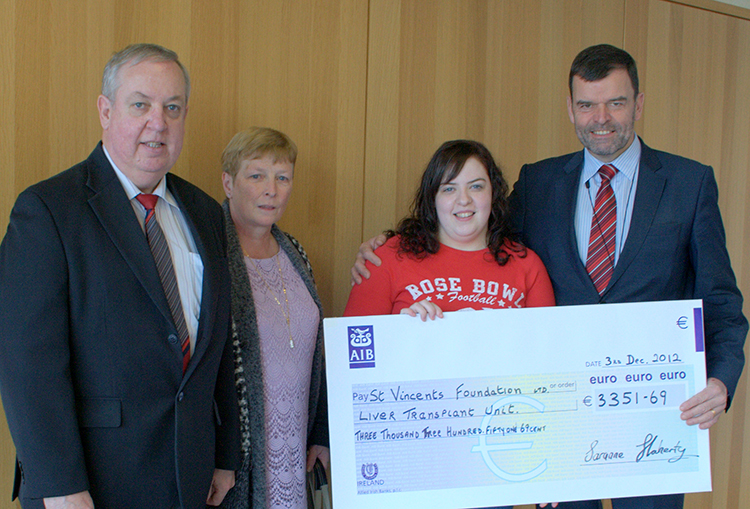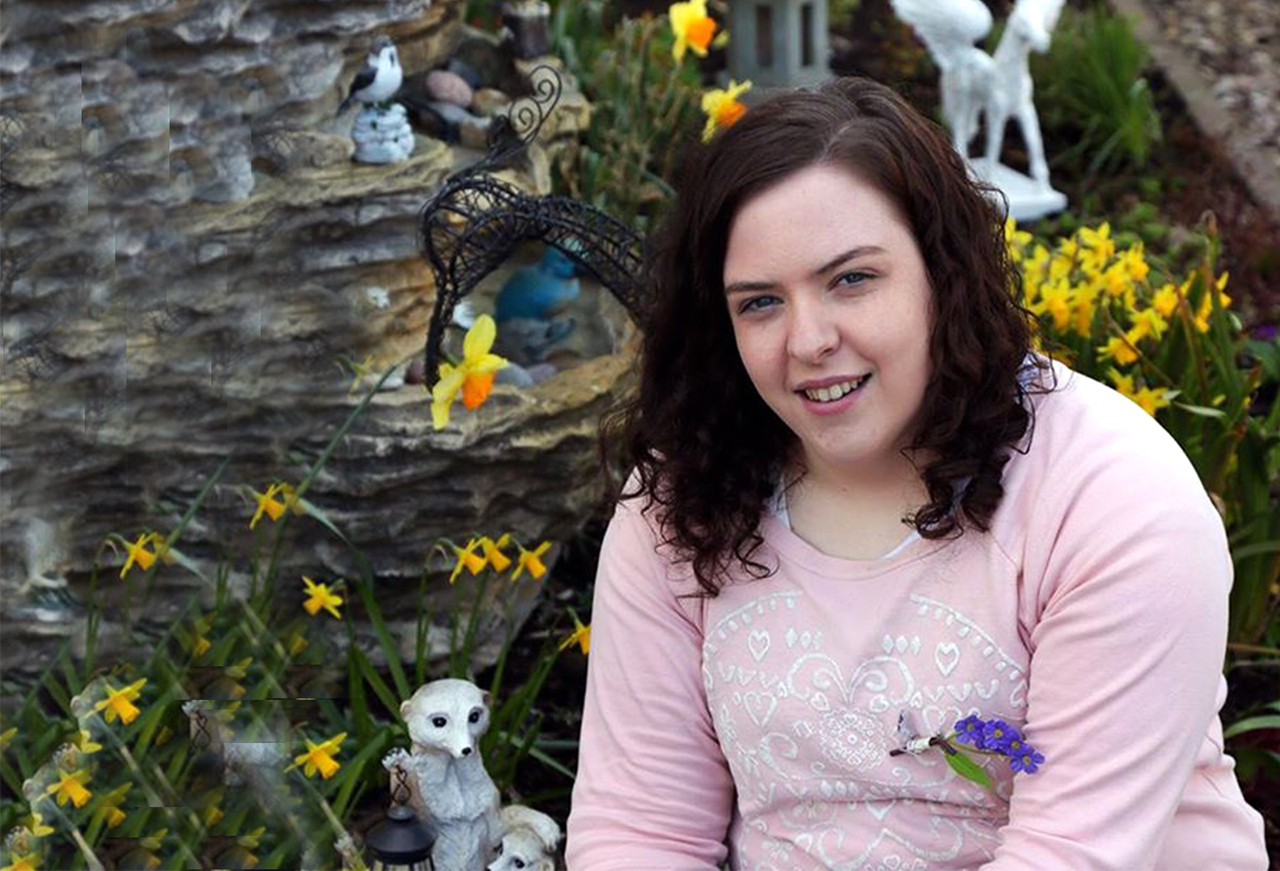Saranne Flaherty rang the Claregalway Hotel on Monday of the Galway Races in July 2011 to tell her employers that she was sick and couldn’t come in.
The 20 year old was worried that they’d be annoyed with her for calling in sick on their busiest day of the year. As it happened, that soon became the least of her worries. Within months she was crucially ill, waiting for a liver transplant.
Saranne, who had been diagnosed with an auto-immune disorder two years previously, had been complaining of abdominal pains over that weekend in July 2011.
Initially she reckoned it was a pulled muscle, but her doctor referred her to UHG. He was worried she might have a clot on her lung, because of the location of the pain. From UHG she was sent to Merlin Park where she spent two and a half weeks, undergoing CAT scans and MRI’s to try and locate the cause of the problem.
Eventually she was told that there was a clot on the hepatic vein, leading into her liver, and it was causing a blockage—a rare condition, which results in excessive bleeding, and the contraceptive pill which she was taking for menstrual problems.
Two attempts to surgically remove the clot here in Galway failed and Saranne was told she would have to go to Dublin’s St Vincent’s Hospital, or possibly to Birmingham for further treatment.
That was late August, by which time the pain had abated. Because she didn’t display all the symptoms of the condition, and since her liver was still functioning, she was sent home. But she knew this was a temporary respite and by late October, the pain returned. In addition, her stomach started swelling up and she became very sick,
In November Saranne was sent to St Vincent’s Hospital for a non-surgical procedure known as TIPS which creates new connections to the veins serving the liver. Had it succeeded, it would have removed the need for surgery,
The procedure was delayed when she got an infection, so it didn’t take place until three weeks later. During that time, she kept hearing the specialists say that TIPS would solve her problem if it worked. She didn’t dwell too much on what would happen if it didn’t.
Her mother, Patricia, spent most of her time with Saranne—fortunately for her daughter, she was a nurse and understood most of what was going on. They were lucky in that Patricia is originally a Dubliner and could stay in her family home. Saranne’s father, Gerry, was also there but he found it especially tough, she recalls.
The first thing Saranne asked when she woke up after the TIPS procedure was ‘did it work?’ only to be told it hadn’t.
“There was a nurse at the end of my bed preparing her notes, so I thought this is bad,” Saranne recalls.
By now it was early December and she was very sick. Her liver and kidneys had started to fail, because all the other veins in her liver had also clotted. She was moved to Intensive Care where she was put on a dialysis machine and fed via a tube.
On the third of December, 2011, Saranne’s specialist told her she needed a liver transplant. She asked how long she’d be in hospital waiting for this and was told it could be “days, weeks or months”.
“By then I was too sick to care and I said ‘do whatever’, she says.
Unbelievably, that very night at 11pm she was visited by a Transplant Co-ordinator, who told her that a liver had become available. The following morning Saranne’s parents arrived at 5am and she was brought to theatre at 6am, where the operation took four and a half hours.
The last thing she remembers after the anaesthetic is seeing the big light in the operating theatre and one of the team saying “we’ll see you in a few hours”.
“I’m missing a few days then,” she says, but remembers that when she did come around, her first request to the nurse was to turn on TV so she could see X-Factor. She was still wired up to tubes for feeding and fluid removal, but within a few days she was removed from the Intensive Care Unit to the High Dependency Unit, a sign everything was going fine. Once the new liver started to work, her kidneys kicked in and she felt healthier than she had done in months.
“I was told by the doctors that I was a poster girl for a liver transplant, because I was the right age, the right size and the right blood group,” she recalls.
On December 15th, eleven days after the transplant, she was back at home in Claregalway. It was the best Christmas present ever for her and her family she says, but she knows that it came at a high price for somebody else and their family.
“I thank my organ donor and their family every day because without that donor I would not be alive,” she stresses.
Today, Saranne is like any regular 23 year old in that she likes to socialise and have fun with her friends. She loves all kinds of music and can be found regularly at the Claregalway Hotel when there are concerts there.
But she doesn’t go out too much, because she gets tired. And, unlike most people her age, she rarely drinks due to her condition and her transplant.
“I’m allowed one drink on special occasions but I rarely bother. I like being able to bring my car out and to drive it home.”
While the transplant has worked, Saranne still has two auto-immune syndromes which can cause contradictory problems of excessive clotting and excessive bleeding. She is currently on Warfarin to prevent further clotting and can’t take part in contact sport—no great loss, she laughs; she never played those games anyway. But she exercises by swimming regularly, having been taught how to by her friend Barbara after receiving the transplant.
Saranne’s diet is restricted too, but not overly. She can’t eat too too many green vegetables because of the Warfarin, and she has to restrict her salt intake, so sausages, rashers and crisps are out—she never ate crisps anyway, she says, although she does love bacon and cabbage, which her mother prepares specially for her.
The greatest impact has been on her energy levels. After her operation she began training in childcare but had to give it up because she was exhausted constantly. She is on a range of drugs, including immuno-suppressants, so that her body won’t reject the transplanted liver. These work but have a knock-on affect on her immune system. Combined with her auto-immune conditions, that leaves her vulnerable to illness. For instance, if Saranne gets a chest infection it takes two courses of antibiotics to cure it. Or a tummy bug that could last 24 hours in another person could last a week for her.
So, she has to figure out what she can work at that will have least impact on her system.
Still, life is good. As an only girl—and the youngest child—she was always the pet and, particularly, the apple of her father’s eye. These days all her family spoil her she says, although she doesn’t take advantage of it. Her mother Patricia took a lot of time off work to look after Saranne who lives in a flat adjoining her parents’ home. And to mark the first anniversary of her liver transplant her father Gerry organised a fundraiser, raising over €3,300 for the Liver Unit at St. Vincent’s Hospital.

Pictured are Gerry, Patricia and Saranne Flaherty, presenting a cheque for €3351.69 to John Hickey CEO of St Vincents Foundation.
She has two brothers, Tony and David. Tony is getting married soon and Saranne will be one of the bridesmaids, something she’s looking forward to hugely. “Claire (his fiancée) is like a sister to me now,” she says.
And Saranne is in a relationship with a young man from Tuam. In the future, there’s no reason why she couldn’t have children, but she will need to be monitored, she says.
Her positive attitude has stood to her and the team in the hospital reassured her that people with such a good attitude succeed better post-transplant than people who are less positive.
Saranne herself had never thought about organ donation until she needed a transplant herself. Now she urges everybody to carry a donor card.
The life expectancy for a transplanted liver is ten to fifteen years, but she has met people who received transplants thirty and forty years ago whose livers are still functioning.
“Sometimes I think as the years go on, will anything go wrong, but then on the other hand I was told I was a perfect candidate and I have a better life than lots of people who never had a transplant.”


